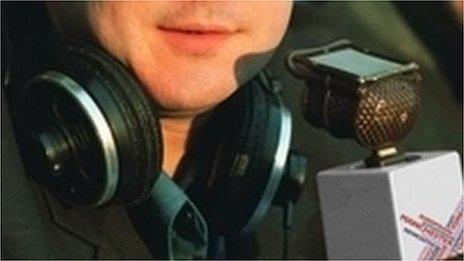Allen Stanford: 'Embarrassment to England cricket makes me sad'
- Published
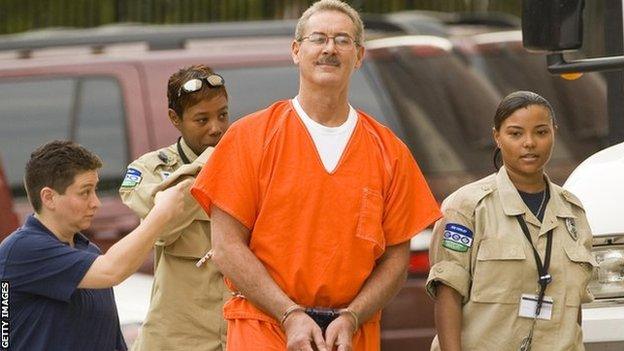
Stanford was found guilty of a multi-billion dollar investment fraud
Jailed fraudster Allen Stanford says the embarrassment he caused English cricket chiefs "breaks my heart".
In his first interview since being indicted in 2009 for carrying out the second largest investment scam in US history - a crime for which he is serving a 110-year prison term - the Texan told BBC Sport he is "very sad" about the damage his conviction did to the sport.
I did exploit cricket - Stanford
In 2008 the former billionaire signed a controversial agreement with the England and Wales Cricket Board (ECB) for a multi-million pound series of matches., external
Stanford on life in prison |
|---|
In a notorious publicity stunt, Stanford flew into Lord's aboard a private helicopter laden with a treasure chest filled with fake dollar notes.
But the following year the ECB was left humiliated when Stanford was charged with fraud worth $8bn. Convicted in 2012, Stanford denies any wrongdoing and has vowed to clear his name.
Who is Allen Stanford? |
|---|
When asked how he felt about the humiliation the ECB had suffered as a result of its association with him, Stanford said: "It makes me very, very sad. I'm very sorry".
Speaking from the maximum-security Coleman II federal prison in Sumterville, Florida, he admitted: "It breaks my heart and there's nothing I can say other than that was not caused by Allen Stanford.
"That was caused by the wrongful prosecution... an over zealous and a wrongful prosecution."
Stanford signed a deal with the ECB for a series of five Twenty20 games between England and a Caribbean side nicknamed the 'Stanford All-Stars'. The winners of each of the five games would collect a prize-fund of $20m (£13.75m), the largest ever for a team sporting event. The losers would get nothing.
The exuberant tycoon promoted the series by flying into Lord's, where he was greeted by the ECB's then chairman Giles Clarke and chief executive David Collier.
The long-term deal collapsed the following year when the US Securities and Exchange Commission charged Stanford, and the ECB cut all ties. But many felt the the governing body had been blinded by Stanford's wealth and should have seen the warning signs. Both Clarke's and Collier's reputations were damaged by the ill-fated partnership.
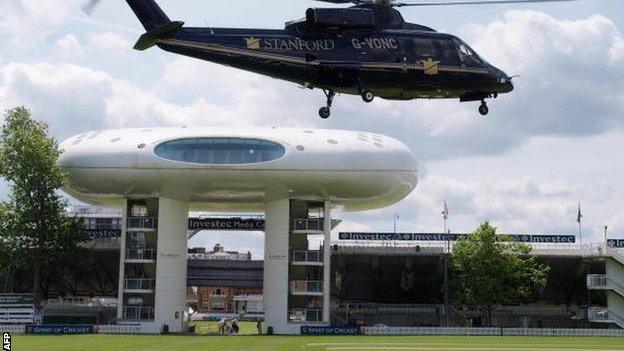
Stanford touched down at Lord's to promote his $20m tournament
"I'm not sure if Giles Clarke is still the head person now, but he and I got along well," said Stanford.
"And I think the world of David Collier.
"My dealing with the ECB was one of professionalism and one of mutual respect and I love cricket."
Ultimately, only one match took place between England and the All Stars, England suffering a humiliating 10-wicket defeat, external in Antigua in November 2008. Stanford also ended up having to apologise to the losing team for cavorting with some of their wives and girlfriends during their warm-up victory over Middlesex, at one point bouncing the pregnant wife of wicketkeeper Matt Prior on his knee.
"To tell you the truth I don't remember doing that," he said.
"It's one of those blurry blank spots. What I remember is going down there, I didn't know who they were. I just saw a group of young gals sitting there and they were waving at me and the camera was following me around and they said 'come over here and take your picture with us' so I did.
"There was one chair shy of having us all sitting there, so I said 'here come sit on my knee', and we were going to take a picture and that was the end of it.
"I had no idea those were the English players' wives and that created quite a bit of an uproar. But I apologised for it. I went over to the English locker room and I apologised to the guys. I said 'look I was just over there having fun with the crowd like I always do, I was just horsing around, I didn't mean anything by it', and they accepted my apology."

Stanford with then England captain Kevin Pietersen at the $20m event in the Caribbean in 2008
Stanford's involvement in cricket began in 2006, when the Antigua-based banker created and funded the first Stanford 20/20 tournament. By the time a second tournament took place in 2008, watched by a reported global audience of 300 million, he was considered the world's leading promoter of the sport, and a cricket innovator.
When asked what he thought of those who said he had exploited cricket, Stanford said: "I would say they are absolutely correct.
"I was trying to grow the Stanford brand globally. I mean anybody would be foolish not to spend the money, and I spent about $30-odd million on cricket in the West Indies in addition to what I spent on the 20/20 for 20 tournament.
"But I certainly did want a return on that investment in terms of a business sense.
"But what nobody understood is that I anticipated this new generation of players that we were going to uncover.
"When we had our first cricket tournament we broadcast that and I gave the TV rights away globally. We had over a billion people watch our matches and that was the island versus island competition.

Stanford presents the Stanford Super Series trophy to winning skipper Chris Gayle
"My goal was to have a vehicle where I could uncover new talent, take the money that this tournament generated, and pile it back into the island so that they could develop their own programmes, home-grow these young athletes and bring them to the Stanford 20/20. We would pick the best players out of the tournament. These would not be the superstars that currently play for the West Indies, these would be unknown young guys.
"In the West Indies we have the greatest physical athletic talent for cricket anywhere in the world. They were just being diverted into other sports, whether it's basketball or soccer. There just wasn't that real incentive for them to stay and play in a sport that had not kept track with the 21st Century and the modernisation of the sport."
Stanford says he never watches cricket now he is behind bars.
"Cricket is not a very big sport in prison. In fact, I've had to educate some of the guys what cricket is all about. Occasionally I run into a guy from the West Indies - it filters through the system here, and of course they know who I am and we immediately have a talk.
"But cricket is not shown on any of the few televisions that are available here.
"I try to keep up with it best I can, but my focus right now is to get out of prison and to see these wrongs made right and to see that I get back with my family."
Listen again to the BBC Radio 5 live special on the Allen Stanford interview broadcast on 21:00 on Monday, 11 January.
- Attribution
- Published11 January 2016
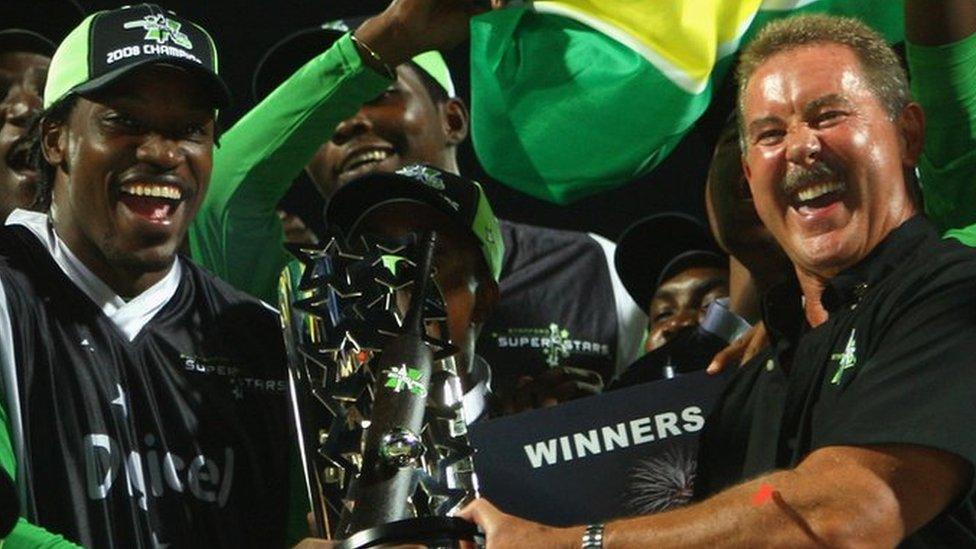
- Attribution
- Published8 March 2012
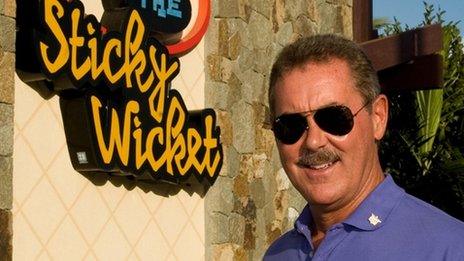
- Published15 May 2018
